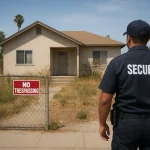Hospitals are sensitive environments where safety, order, and security are essential for patients, visitors, and staff. Hospital security guards ensure that the facility runs smoothly without disruptions or risks. Their role includes monitoring entrances, handling emergencies, protecting property, and controlling access to restricted areas. As modern healthcare facilities continue to expand and become increasingly busy, the demand for specialized security services in hospitals has grown. The duties and responsibilities of a security guard are crucial in ensuring the reliable security of a hospital facility at all times.
What is a Hospital Security Guard?
A security guard at a hospital is a trained professional responsible for safeguarding patients, medical staff, visitors, and property. Their duties involve patrolling, monitoring surveillance systems, managing entry points, and responding to emergencies. In collaboration with doctors and administrators, they help maintain a safe healthcare environment. With extensive training, hospital security guards strike a balance between protection and compassion, ensuring the hospital remains a secure environment that fosters healing and care.
Common Security Threats at Hospitals and Healthcare Facilities
Hospitals in Los Angeles County face unique safety challenges due to their open access, valuable equipment, and constant flow of visitors. These factors make them vulnerable to incidents that require strict hospital facility security. Let’s explore some common security threats at hospitals and healthcare facilities.
1. Unauthorized Access to Restricted Hospital Areas
Hospitals are open spaces, making them prone to unauthorized entry. A security guard at a hospital ensures that only permitted individuals can access restricted areas, such as ICUs, pharmacies, or operating theaters. Guards verify identification, monitor entrances, and keep records of visitors. By controlling access, guards protect patients, staff, and sensitive zones, fulfilling vital hospital security guard responsibilities every day.
2. Theft of Critical Medical Equipment and Supplies
Expensive machines, tools, and medicines are prime targets for theft. A hospital security officer protects assets by monitoring vulnerable areas, checking storage rooms, and watching surveillance systems. Guards conduct regular patrols to identify suspicious activity and report threats immediately. With effective hospital security services, hospitals reduce risks of financial loss.
3. Incidents of Violence or Aggression Toward Staff and Patients
Emotional stress sometimes causes patients or visitors to act aggressively. A security guard at a hospital is trained to manage conflicts calmly, protecting medical staff and other patients. Guards de-escalate situations using professional techniques, preventing harm and restoring order. Whether involving aggressive visitors or disputes, security services ensure safety and dignity for all.
4. Vandalism and Damage to Hospital Property
Hospitals contain valuable infrastructure, making them prone to vandalism or property damage. Guards provide security by patrolling sensitive areas, monitoring cameras, and deterring unlawful activity. Hospital security guards ensure that property, such as ambulances, equipment, and buildings, remains safe from harm. By responding quickly to incidents, guards minimize damage and maintain hospital order.
5. Emergency Situations Requiring Immediate Security Response
Emergencies such as fires, natural disasters, or sudden medical crises require immediate action. A hospital security officer is trained to assist in evacuations, guide patients and visitors, and implement safety procedures. Guards coordinate with medical staff and authorities to ensure quick responses. Reliable hospital security services reduce chaos during crises.
What Does Hospital Security Do – Duties and Responsibilities Explained
A security guard at a hospital must remain alert, proactive, and ready to respond at all times. Let’s find some critical duties and responsibilities of a hospital security guard that ensure safety and security within healthcare facilities:
1. Access Control and Monitoring of Restricted Hospital Areas
Controlling access is one of the most essential hospital security guard duties. Guards monitor entrances, verify visitor IDs, and regulate access to sensitive areas, such as ICUs and surgical wards. By implementing strict protocols, they prevent unauthorized access, thereby ensuring patient safety. Effective hospital facility security ensures that only authorized personnel, including medical staff and approved visitors, can enter restricted areas. By maintaining strong access control, a security guard at a hospital reduces threats, creating a safe healthcare environment where patients and staff feel protected at all times.
2. Surveillance Monitoring Through Advanced Security Systems
Surveillance is a central component of hospital security services. Guards monitor CCTV systems and patrol high-risk areas, including emergency wards, pharmacies, and parking lots. A vigilant security guard identifies unusual activities before they escalate into security breaches. Regular observation also deters theft, vandalism, or unauthorized entry. Hospital facility security relies on trained guards who know how to respond quickly. By combining patrols and technology, security companies ensure complete coverage.
3. Emergency Response to Critical Situations in Healthcare Facilities
Hospitals are prone to emergencies, from fires to aggressive incidents. A hospital security officer is trained to respond quickly and effectively, ensuring safety protocols are followed. Whether assisting in evacuations, guiding patients, or alerting authorities, guards minimize panic and damage. In critical times, armed security can also provide an added layer of protection. Security companies ensure that their guards are prepared for every scenario. Emergency response is one of the most essential responsibilities of a hospital security guard, ensuring that patients, visitors, and staff remain safe during unexpected and high-pressure situations.
4. Ensuring Patient and Staff Safety Across All Hospital Departments
The safety of patients and staff is a core responsibility of a security guard at a hospital. Guards protect vulnerable patients from external threats and ensure medical staff can work without fear of disruption. Through regular patrols and vigilance, they create a safe environment for healing. Security services also include escorting staff during night shifts or securing patient belongings. With training from hospital security companies, guards demonstrate both authority and empathy. Ensuring safety is one of the primary duties of a hospital security guard, providing peace of mind and fostering trust within the hospital community.
5. Conflict Resolution and De-Escalation of Aggressive Behavior
Conflicts may arise in hospitals due to stress, miscommunication, or disputes among patients, visitors, or staff. A hospital security officer plays a key role in resolving these issues calmly. They use communication techniques to de-escalate tensions, preventing violence. Professional healthcare facility security ensures disputes are managed without disturbing hospital operations. Whether mediating between families or assisting staff, guards maintain harmony. This is a vital part of a hospital security guard’s responsibilities, protecting both the emotional and physical well-being of patients and staff.
6. Property Protection and Safeguarding of Hospital Assets
Hospitals house expensive medical equipment, vehicles, and infrastructure, all of which require strict security for their facilities. Guards patrol the premises, monitor storage areas, and prevent vandalism or theft. A security guard ensures property remains secure while deterring potential criminals. Their presence itself discourages unlawful activity. Security companies provide trained staff who understand the value of hospital assets. Protecting property is among the most crucial duties of a guard, preventing losses that could compromise patient care and safety.
7. Coordination with Local Authorities and Law Enforcement Agencies
In serious incidents, a security guard in Palmdale must coordinate with local police, fire departments, or emergency responders to ensure a swift and effective response. This collaboration ensures that incidents are managed efficiently and in accordance with the law. Hospital security services prepare guards for these roles, equipping them with communication and reporting skills. Coordination also involves sharing surveillance evidence or assisting in investigations. Whether involving theft, violence, or disasters, hospital security companies train guards to work alongside external agencies.
Secure Healthcare Facilities With Professional Guards
The duties and responsibilities of a hospital security guard are critical in ensuring safety, discipline, and trust within healthcare facilities. From access control to emergency response, their role is indispensable in protecting lives and property.
For reliable hospital security near you, trust Ranger Global Security, a leading security guard company in Temecula, Riverside County. Our expert team delivers top-quality security, providing specialized security for hospital facilities to ensure the safety of patients, staff, and assets. Contact us today for the most dependable protection at hospital facilities.





